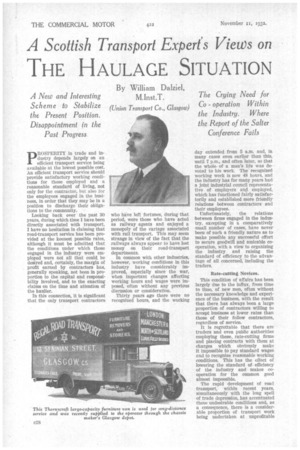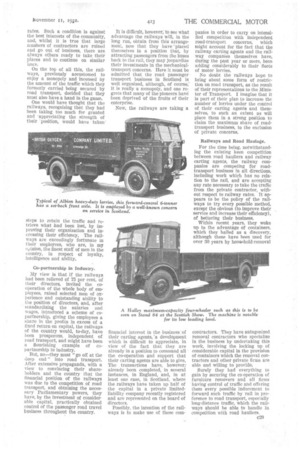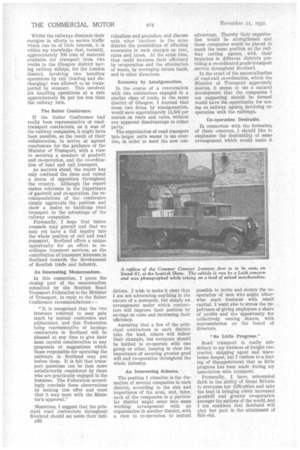A Scottish Transport Expert's Views on
Page 70

Page 71

Page 72

If you've noticed an error in this article please click here to report it so we can fix it.
THE HAULAGE SITUATION
By William Dalziel,
(Union Transport Co., Glasgow)
A New and Interesting Scheme to Stabilize the Present Position. Disappointment in the Past Progress The Crying Need for Co operation Within the Industry. Where the Report of the Salter Conference Fails
PROSPERITY in trade and industry depends largely on an efficient transport service being available at the lowest possible cost. An efficient transport service should provide satisfactory working conditions for those employed and a reasonable standard of living, not only for the contractor, but also for the employees engaged in the business, in order that they may be in a position to discharge their obligations to the community.
Looking back over the past 30 years, during which time I have been directly associated with transport, I have no hesitation in claiming that road-transport service has been provided at the keenest possible rates, although it must be admitted that the conditions under which those engaged in the industry were employed were not all that could, be desired and, certainly, the margin of profit earned by contractors has, generally speaking, not been in proportion to the capital and responsibility involved, and to the exacting claims on the time and attention of the haulier.
In this connection, it is significant that the only transport contractors who have left fortunes, during that period, were those who have acted as railway agents and enjoyed a monopoly of the cartage associated with rail transport. This may seem strange in view of the fact that the railways always appear to have lost money on their road-transport departments.
In common with other industries, however, working conditions in this industry have considerably improved, especially since the war, when important changes affecting working hours and wages were imposed, often without any previous discussion or consideration.
Thirty years ago there were no recognized hours, and the working day extended from 5 a.m. and, in many cases even earlier than this, until 7 p.m., and often later, so that the whole. of a man's life was devoted to his work. The recognized working week is now 48 hours, and the industry has for many years had a joint industrial council representative of employers and employed, which has functioned fairly satisfactorily and established more friendly relations between contractors and their employees.
Unfortunately, the relations between firms engaged in the industry, excepting in a comparatively small number of cases, have never been of such a friendly nature as to make possible any successful effort to secure goodwill and amicable cooperation, with a view to organizing the industry and raising the standard of efficiency to the advantage of all concerned, including the traders.
Rate-cutting Novices.
This condition of affairs has been largely due to the influx, from time to time, of new men, often without the necessary knowledge and experience of the business, with the result that there has always been a large proportion of contractors willing to accept business at lower rates than those of their fellow contractors, regardless of service.
It is regrettable that there are traders and even public authorities employing these, rate-cutting firms and placing contracts with them at charges which obviously make it impossible to pay standard wages and to recognize reasonable working conditions. This has the effect of lowering the standard ofefficiency of the industry and makes cooperation for the common good almost impossible.
The rapid development of road transport, within recent years, simultaneously with the long spell of trade depression, has accentuated these undesirable conditions and, as a consequence, there is a considerable proportion of transport work being undertaken at unprofitable rates. Such a condition is against the best interests of the community, and, whilst it is true that large numbers of contractors are ruined and go out of business, there are always others ready to take their places and to continue on similar On the top of all this, the railways, previously accustomed to enjoy a monopoly and incensed by the amount of the traffic which they formerly carried being secured by road transport, decided that they must also have a hand in the game.
One would have thought that the railways, recognizing that they had been taking too much for granted and 'appreciating the strength of their position, would have taken' steps to retain the traffic and retrieve what had been lost, by improving their organization and increasing their efficiency. The railways are exceedingly fortunate in their employees, who are, in my opinion, the finest staff of men in the country, in respect of loyalty, intelligence and ability.
Co-partnership in Industry.
My view is that if the railways had been relieved of 75 per cent, of their directors, invited the cooperation of the whole body of employees, raised selected men of experience and outstanding ability to the position of directors, and, after standardizing the salaries and wages, introduced a scheme of copartnership, giving the employees a share in the profits in excess of a fixed return on capital, the railways of the country would, to-day, have been prosperous, independent of road transport, and might have been a flourishing example of copartnership in industry.
But, no—they must "go off at the deep end " into road transport. After extensive propaganda, with a view to convincing their shareholders, and the country that the financial position of the railways was due to the competition of road transport, and obtaining the necessary Parliamentary powers, they have, by the investment of considerable capital, practically obtained control of the passenger road travel business throughout the country. It is difficult, however; to see what advantage the railways will, in the long run, obtain from this arrangement, now that they have "placed themselves in a position that, by attracting passengers from the buses back to the rail, they may jeopardize their investments in the mechanicaltransport concerns. Here it must be admitted that the road passenger transport business in Scotland is well organized, although, of course; it is really a monopoly, and one regrets that many of the pioneers have been deprived of the fruits of their enterprise.
Now, the railways are taking a financial interest in the business of their carting agents, 'a development which is difficult to appreciate, in view of the fact that they are already in a position to command all the co-operation and support that their carting agents are able to give. The transactions have, however; already been completed, in several instances, in England, and, in •at least one case, in Scotland, where the railways have taken up half of the capital in a private limitedliability company recently registered and are represented on the board of directors.
Possibly, the intention of the railways is to make use of these cons
palsies in order to carry on intensified competition with independent road-transport concerns, which might account for the fact that the railway carting agents and the railway companies themselves have, during the past year or more, been adding considerably to their fleets of motor lorries.
No doubt the railways hope to bring about some form of restriction on road transport, as the result of their representations to the Minister of Transport. I imagine that it is part of their plan to increase the number of lorries under the control of their carting agents and themselves, to such an extent as will place them in a strong position to claim the maximum share of roadtransport business, to the exclusion of private concerns.
Railways and Road Haulage.
For the time being, notwithstanding the existing keen competition between road hauliers and railway carting agents, the railway companies are competing for roadtransport business in all directions, including work which has no relation to the rail, and are accepting any rate necessary to take the traffic from the private contractor, without respect to railway rates. It appears to be the policy of the railways to try every possible method, except the obvious (to improve their service and increase their efficiency), of bettering their business.
Within recent years, they woke up to the advantage of containers, which they hailed as a discoYerY, although these have been used for over 30 years by household-removal contractors. They have antagonized removal contractors who specialize in the business by undertaking this work, involving the locking up of considerable capital in the provision of containers which the removal contractors and other private firms are able and willing to provide.
Surely they had everything to gain by securing the co-operation of furniture removers and all firms having control of traffic and offering them every possible inducement to forward such traffic by rail in preference to road transport, especially long-distance traffic, which the railways should be able to handle in competition with road hauliers. Whilst the railways dissipate their energies in efforts to secure traffic which can be of little interest, it is within my knowledge that, recently, approximately 700 tons of material available for transport from two works in the Glasgow district having railway sidings, for the London district, involving two handling operations by rail (loading and discharging) was allowed to be transported by steamer. This involved six handling operations at a rate approximately 39. per ton less than the railway rate.
The Salter Conference.
If the Salter Conference had really been representative of roadtransport contractors, as it was of the railway companies, it might have been possible, as the result of their collaboration, to arrive at agreed conclusions for the guidance of the Minister of Transport, with a view to securing a measure of goodwill and co-operation, and the co-ordination of road and rail transport.
As matters stand, the report has only confused the issue and raised a storm of opposition throughout the country. Although the report makes reference to the importance of goodwill and co-operation, the recommendations of the conference simply aggravate the position and show a desire to handicap road transport to the advantage of the railway companies.
Personally, I hope that better counsels may prevail and that we may yet have a full inquiry into the whole position of rail and road transport. Scotland offers a unique opportunity for an effort to coordinate transport services, as the contribution of transport interests in Scotland towards the development of Sccittish trade and industry.
An Interesting Memorandum.
In this connection, I quote the closing part of the memorandum submitted by the Scottish Road Transport Federation to the Minister of Transport, in reply to the Salter Conference recommendations:— " It is recognized that the two interests referred to may gain much by mutual conference and adjustment, and this Federation being representative of haulage contractors in Scotland will be pleased at any time to give their most careful consideration to any proposals or suggestions which those responsible for operating the railways in Scotland may put before them. It is felt that transport questions can be thus more satisfactorily considered by those who are practically engaged in the business. The Federation accordingly conclude these observations by making this offer and trust that it may meet with the Minister's approval."
Meantime, I suggest that the principal road contractors throughout Scotland should set aside their indi e20 vidualism and prejudice, and discuss with other hauliers in the same district the possibilities of effecting economies in such charges as rent, rates and taxes. At the same time, they could increase their efficiency by co-operation and the elimination of waste, by arranging return loads, and in other directions.
Economy by Amalgamation.
In the course of a conversation with two contractors engaged in a similar class of trade, in the same district of Glasgow, I learned that these two firms, by amalgamation, would save approximately £1,500 per annum on rents and rates, without any apparent disadvantage to either party.
The organization of road transport into larger units seems to me overdue, in order to meet the new con ditions. I wish to make it clear that I am not advocating anything in the nature of a monopoly, but simply an arrangement under which contractors will improve their position by savings on costs and increasing their efficiency.
Assuming that a few of the principal contractors in each district take the lead, others will follow their example, but everyone should be invited to co-operate with one group or other, keeping in view the importance of securing greater good will and co-operation throughout the whole industry.
An Interesting Scheme.
The position I visualize is the formation of several companies in each district, according to the size and importance of the area, and, later, each of the companies in a particular district might enter into some working arrangement with an organization in another district, with a view to co-operation to mutual advantage. Thereby their organization would be strengthened and these companies would be placed in much the same position as the railway carting agents, with their branches in different districts providing a co-ordinated goods-transport service throughout Scotland.
In the event of the materialization of road-rail co-ordination, which the Minister of Transport apparently desires, it seems to me a natural development that the companies I am suggesting should be formed would have the opportunity for acting as railway agents, involving cooperation with the railways.
Co-operation Desirable.
In connection with the forthaticx of these concerns, I should like to emphasize the desirability of some arrangement which would make it possible to invite and secure the cooperation of men who might otherwise start business with small capital. I want also to stress the importance of giving employees,a share Of profits and the opportunity for collectively owning shares, with representation on the board of directors.
"So Little Progress."
Road transport is really subsidiary to my business of freight contractor, shipping agent and warehouse keeper, but I confess to a feeling of disappointment that so little progress has been made during my association with transport.
Personally, I have unbounded faith in the ability of Great Britain to overcome her difficulties and take the lead in bringing about increased goodwill and greater co-operation amongst the nations of the world, and I am confident that Scotland will play her part in the attainment of this end.




















































































































































